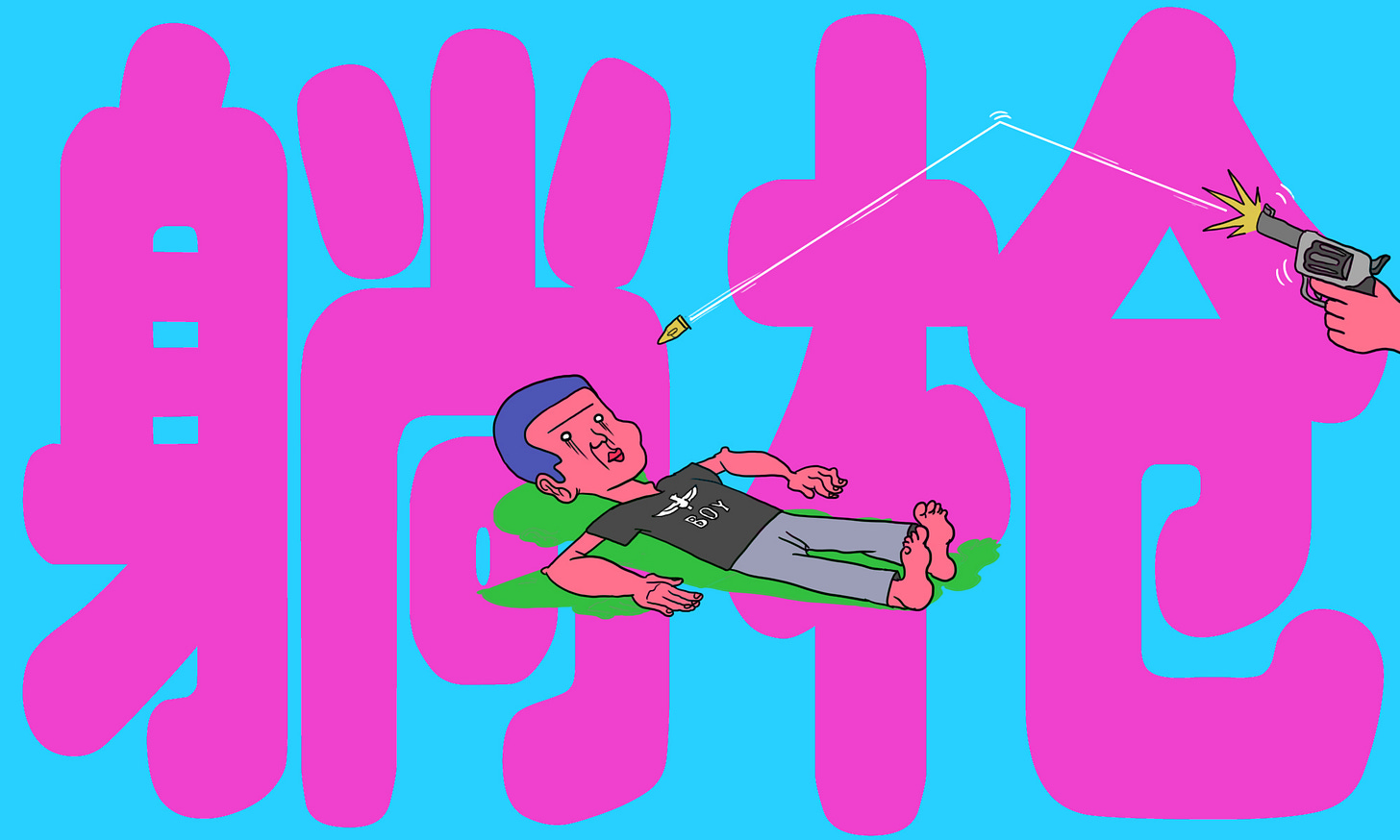Welcome to RealTime Mandarin—a multimedia resource to immerse you in the latest Chinese language trends, inspire you to practice and improve your Mandarin every week, and empower you to communicate with confidence.
Subscribe now to get the next issue straight to your inbox!
A brutal assault on a group of young women diners at a restaurant in the northern Chinese city of Tángshān 唐山 last weekend was caught on camera and shared on social media.
The footage of this awful attack went viral and has caused uproar in China.
One of the four attackers was wearing a T-shirt by Boy London. The British fashion label later faced a severe public backlash for being in the wrong place at the wrong time.
Netizens are calling for it to be boycotted, associating the brand with thugs in China (Chinese, Sohu):
不少网友在品牌官方微博号评论处留言称其为“黑社会工作服”,还让品牌“把消费者画像拉出来,让大家避避雷”。
Many netizens are leaving comments on the brand’s official Weibo account saying it is the ‘uniform of the Chinese mafia’, and ask the company to ‘publish profiles of its customers in order to allow people to avoid trouble’.
The warnings to stay away from the stereotypical thug, or 社会大哥 shè huì dà gē, in China go on…
如果看到留着“劳改的发型”,圆头圆脑圆身子,戴着金链子、身穿BOY T恤,有纹身,系爱马仕皮带、拿着手包、手串,穿短裤或者紧身牛仔裤,以及不穿袜子的豆豆鞋这种打扮的人,一定要远离。
Steer well clear of anyone like this: they have a shaved head and are overweight, wear a gold chain and a BOY London T-shirt, are tattooed, wear a Hermes Belt, a clutch bag, a bracelet, shorts or skin-tight jeans, and they wear beanie shoes without socks.
It’s going to be hard for Boy London, whose business in China was already in decline, to recover from such a bad blow to its reputation.
While one independent fashion industry analyst Táng Xiǎotáng 唐小唐 is more hopeful:
“抵制相对来说是暂时的,有人喜欢有人不喜欢,土潮也是潮。最终也可能带来一波宣传,很难预测”。
Boycotting is relatively short-lived. Some people like the brand and some people don’t. A tacky style can also be trendy. In the end it may bring some kind of exposure. It is hard to say.
But that’s unlikely, as the article concludes:
因为唐山打人事件,BOYLONDON未来的发展前景或许又是不太明朗
Boy London’s future growth prospects in China are not too clear due to the consequences of the Tangshan attack.
So this week we explore online conversations about how an early-moving international brand in China has become collateral damage in this appalling attack.
The Favourite Five

1. 破伞 pò sǎn
break the umbrella; remove people in the system that protect criminals
唐山打人者劣迹斑斑,“扫黑破伞”除恶务尽 - The instigators of the Tanshan attack are the worse kind of people. ‘Rooting out mafia groups and those that collude with them in the system’ must be done to remove evil from society.
Related: 保护伞 bǎo hù sǎn - protective umbrella, a metaphor for low level officials within the establishment that work with and protect mafia and criminal gangs in Chinese cities.
2. 躺枪 tǎng qiāng
get shot even when lying down; collateral damage
BOY LONDON这次算是躺枪了 - Boy London has become collateral damage in this.
More: this phrase first appeared in a Hong Kong movie in the 1990’s. Read more in this week’s Phrase of the Week in SupChina.
3. 避雷 bì léi
avoid lightening; stay out of trouble
让品牌把消费者画像拉出来,让大家避避雷 - Get the brand to publish customer profiles, so that people can avoid trouble.
Note: ‘avoid lightening’ is an Internet slang word that has become popular in recent years. It normally refers to avoiding a bad product. There’s also a link and play on words with the Henan government’s response to the Tangshan attack with its Thunderstorm Special Action (雷霆风暴专项行动 léi tíng fēng bào zhuān xiàng xíng dòng) - which also ties in with the umbrella breaking theme too.
4. 社会大哥 shè huì dà gē
social big brother; thug
因为一件T恤引发了网友们关于“社会大哥”着装的探讨 - This one T-shirt has caused netizens to discuss the clothing of thugs in China.
5. 上纲上线 shàng gāng shàng xiàn
treat petty issues as a matter principle; push things too far
因为某一件负面事件而上纲上线对某款服装和某种穿搭风格做出贬低和非议 - Because of one single negative incident, people have gone way too far criticising a particular clothes brand and way of dressing.
Consuming the Conversation…

Useful words
This week I’ve collated words which track the highs and subsequent lows of Boy London’s journey in China - from high fashion, to tacky trends, and finally the imminent cut price sell-off.
风靡 fēng mí
fashionable
2012年到2015年,是BOY LONDON在国内风靡的顶峰时期 - Boy London was at its peak in popularity between 2012 and 2015 in China.
Related: 风靡一时 fēng mí yī shí - very popular
潮牌 cháo pái
popular brand
BOY LONDON又是少见的主动进入中国的潮牌,特征也很鲜明,身边很多同学都在穿 - Boy London was one of the few mainstream brands to proactively enter the Chinese market. It had a distinctive style and lots of my friends were wearing it.
钟情 zhōng qíng
to love something or someone
“社会大哥”为何如此钟情BOY T恤、爱马仕H扣皮带和金链子?- Why do thugs in China love Boy London T-shirts, Hermes belts and gold chains so much?
钱味 qián wèi
to reek of money
无疑看重的是这两样单品带来的钱味,“有钱”和“有势”一样 - What they care about is that the T-shirt makes them look like they have money, and money also means power.
Related: 铜臭味 tóng chòu wèi the corrupting effect of money, first discussed last December.
土潮 tǔ cháo
tacky trends
抵制相对来说是暂时的,有人喜欢有人不喜欢,土潮也是潮 - Boycotting is relatively short-lived. Some people like it and some people don’t. A tacky style can also be trendy.
Related: 土 tǔ - vulgar, cheap or tacky.
土俗 tǔ sú
local customs; cheap local style
“你离潮人就差一件BOY LONDON”的潮牌变成了如今的“土俗”代表 - The saying that ‘you are one Boy London T-shirt away from becoming fashionable’ has become representative of tackiness in China.
Note: this normally means ‘local customs’ but here it is used ironically playing on the 土tǔ theme.
颓势 tuí shì
decline
这些举措都没能挽回BOY LONDON在国内市场的颓势 - None of these steps can help Boy London reverse its continuing decline in the China market.
被黑 bèi hēi
to be unfairly criticised
网友感叹,“这是BOY这个品牌被黑得最惨的一次。” - Netizens sigh and say: Boy London received the most unfair criticism this time.
甩卖 shuǎi mài
selling goods at cut prices
预计将在当年12月底正式关店并进行清仓甩卖 - We estimate that its online shop will officially be closed at the end of this year after a clearance sale.
Three-character phrases
Three three-character phrases to discuss the predicament that Boy London finds itself in.













